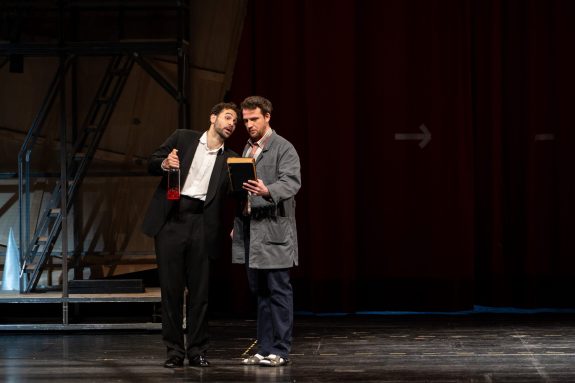 Germany Donizetti, L’elisir d’amore: Soloists, Chorus and Extras of Staatsoper Hannover. Niedersächsisches Staatsorchester Hannover / James Hendry (conductor). Staatsoper Hannover, 26.4.2024. (DMD)
Germany Donizetti, L’elisir d’amore: Soloists, Chorus and Extras of Staatsoper Hannover. Niedersächsisches Staatsorchester Hannover / James Hendry (conductor). Staatsoper Hannover, 26.4.2024. (DMD)

Production:
Director – Tobias Ribitzki
Revival directors – Tobias Ribitzki, Felix Schrödinger
Stage design – Florian Parbs
Costume design – Rebekka Zimlich
Lighting design – Holger Klede
Dramaturgy – Steffi Mieszkowski
Chorus director – Lorenzo Da Rio
Cast:
Adina – Meredith Wohlgemuth
Nemorino – José Simerilla Romero
Belcore – Lluís Calvet i Pey
Dulcamara – Richard Walshe
Gianetta – Dahye Kang
This revival of Tobias Ribitzki’s 2017 production featured an entirely new cast, who clearly enjoyed the performance as much as the audience. And there was indeed much to enjoy. The production set the opera in the theatre, where a company of players in jolly, very colourful bright costumes were performing a medieval tale complete with peasants, damsel in distress (Adina) and knight on a hobbyhorse (Belcore). A stage manager (Dulcamara) distributed or collected props from a trolley, and Gianetta was a leading member of the chorus. All appeared to be amateurs, engaging in their activities for fun, which accounted for some chaos. The set in which the amateur actors performed was imaginatively created by set designer Florian Parbs to suggest a funny makeshift nature, with walls painted on sheets of cloth that kept shifting about in their clumsily created frames. Nemorino was the outsider in this jolly company because he was not one of them. Dressed in a suit, he was a spectator keen to take a look backstage, because he was in love with the actress playing the damsel. Some of the scenes were seen from the perspective of the audience, some scenes gave a backstage perspective.
The play within the play, as performed by the amateur company, was about a love potion (Liebestrank in German) with reference to Tristan and Isolde. In front of the curtain a large panel hung from the fly tower with the word ‘Liebestrank’ in bold letters. At the start of the overture, the letter ‘t’ fell off, the stage manager noticed and repaired it, the wrong way: ‘t’ became ‘k’: ‘Liebeskrank’, lovesick. Towards the end of the opera, further letters were removed and what remained was ‘Liebe’ (love) followed by a question mark. In their exchanges with Nemorino, the actors in the play left their roles of damsel, knight and stage manager to become the characters of the opera we know, Adina, Belcore and Dulcamara. Shifting of roles could become complicated at times, but this only added to the exuberance of the production. The speed at which events shifted and changed also kept the audience attention at a high level throughout. The creative team must have been expecting a certain level of acquaintance with the plot from their audience.

Under the baton of their First Kapellmeister James Hendry, the Niedersächsisches Staatsorchester not only reflected but led and enhanced the production’s attention to detail and command of alertness. Hendry brought the nuances of the score to the fore, relished the floating, swift passages, and gently emphasised unsentimental, genuine and deep feeling. He gave clear guidance to the chorus, directed by Lorenzo Da Rio, whose unison was all the more praiseworthy given that they were in hustling and bustling motion whenever they were in view. Meredith Wohlgemuth played Adina as a headstrong contemporary young woman, struggling endearingly to admit her feelings for Nemorino to herself. She sang with a crystal-clear yet warm, well-rounded voice, secure across registers and with smooth transitions between them. In particular, her coloratura was precise and rendered with perfect ease. José Simerilla Romero’s voice was very well-suited to the music composed for the character of Nemorino. His voice has a firm, reliable core, allowing him considerable flexibility while remaining consistent. Aware of the demands of bel canto, Simerilla Romero excelled particularly in the numerous instances of diminuendo and crescendo, which he mastered without the voice turning thin and near inaudible or forced, respectively.
Lluís Calvet i Pey has been a member of the International Opera Studio of the Hannover State Opera since the beginning of the 2022/23 season, singing many smaller parts across the company’s repertory. He proved to be a versatile actor in combining the sergeant’s non-threatening machismo with the ridiculous characteristics of the knight. The voice sounded strong, well-balanced, and confident. Richard Walshe clearly enjoyed playing both the stage manager and Dulcamara and succeeded in both. His bass-baritone voice was relaxed and appropriately flexible, making his list of the medicine’s alleged benefits, ‘Udite, udite, o rustici’ a highlight of the evening. Dahye Kang contributed a beautifully sung Gianetta. The audience rewarded this lively, enjoyable performance with very warm applause.
Daniel Meyer-Dinkgräfe
